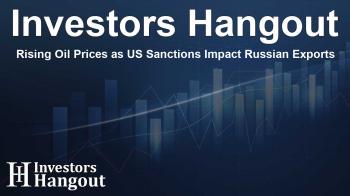Rising Oil Prices as US Sanctions Impact Russian Exports

Oil Prices Surge Due to US Sanctions on Russian Exports
As the oil market opens, we are witnessing a significant surge in oil prices, reaching heights not seen in over three months. This upward trend is primarily fueled by the anticipation that expanded U.S. sanctions will severely impact Russian crude oil supplies to major importers, including China and India.
Current Oil Market Trends
Brent crude oil futures have seen an impressive climb, increasing by $1.35, or 1.69%, bringing the price to $81.11 per barrel. In fact, prices peaked at $81.44 during intraday trading, marking the highest level since late August. Similarly, U.S. West Texas Intermediate (WTI) crude has risen by $1.40, or 1.83%, to reach $77.97 per barrel, after a brief peak at $78.32—its highest since early October.
Sanctions Targeting Russian Oil Producers
Recently, the U.S. Treasury took decisive action by imposing sanctions on Russian oil producers, including big names like Gazprom Neft and Surgutneftegas. These sanctions are not limited to companies alone; they also encompass 183 vessels that have been involved in shipping Russian oil. The primary goal is to disrupt the revenue streams that Moscow has been utilizing to sustain its ongoing military operations.
Impact on Global Oil Supply Chains
Analysts and traders have observed that the new sanctions are likely to impose serious constraints on Russian oil exports. This situation compels major buyers, particularly China and India, to seek alternative oil sources from regions like the Middle East, Africa, and the Americas. Consequently, this shift in sourcing is anticipated to drive up both oil prices and shipping expenses.
Insights from Industry Experts
Harry Tchilinguirian, the head of research at Onyx Capital Group, pointed out that the recent batch of sanctions will have notable consequences, especially for India's oil procurement strategies. This shift is critical as India has been one of the largest recipients of Russian oil. The sanctions may lead to increased competition for alternative sources, further affecting prices.
Future Outlook
As we take a closer look at the ongoing situation, the oil market is tough to predict. The consequences of U.S. sanctions and their ripple effects on global oil trade will continue to evolve, and it will be essential for stakeholders to stay vigilant and adapt swiftly to these changes.
Frequently Asked Questions
What are the recent trends in oil prices?
Currently, oil prices have surged to a high for over three months, largely driven by new U.S. sanctions on Russian exports.
How have U.S. sanctions affected Russian oil exports?
U.S. sanctions are expected to severely limit Russian oil exports, prompting major buyers like China and India to seek alternatives.
What is the impact of rising oil prices?
As oil prices increase, it may lead to higher costs for consumers and businesses, affecting various aspects of the economy.
Which countries are most affected by these sanctions?
The largest importers affected by these changes are China and India, as they will likely have to find new sources for crude oil.
What should we expect in the future regarding oil supply?
Market dynamics will continue to shift as countries adapt their buying strategies, and this could lead to ongoing volatility in oil prices.
About The Author
Contact Lucas Young privately here. Or send an email with ATTN: Lucas Young as the subject to contact@investorshangout.com.
About Investors Hangout
Investors Hangout is a leading online stock forum for financial discussion and learning, offering a wide range of free tools and resources. It draws in traders of all levels, who exchange market knowledge, investigate trading tactics, and keep an eye on industry developments in real time. Featuring financial articles, stock message boards, quotes, charts, company profiles, and live news updates. Through cooperative learning and a wealth of informational resources, it helps users from novices creating their first portfolios to experts honing their techniques. Join Investors Hangout today: https://investorshangout.com/
The content of this article is based on factual, publicly available information and does not represent legal, financial, or investment advice. Investors Hangout does not offer financial advice, and the author is not a licensed financial advisor. Consult a qualified advisor before making any financial or investment decisions based on this article. This article should not be considered advice to purchase, sell, or hold any securities or other investments. If any of the material provided here is inaccurate, please contact us for corrections.

